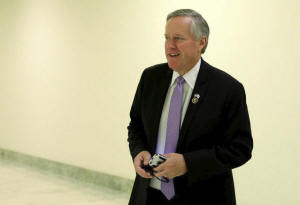|
Trump struggles to win over moderate
Republicans on healthcare overhaul
 Send a link to a friend
Send a link to a friend
 [May 03, 2017]
By Richard Cowan and David Morgan [May 03, 2017]
By Richard Cowan and David Morgan
WASHINGTON (Reuters) - Time was running
short for President Donald Trump to attract enough votes to pass a new
bill to overhaul the U.S. healthcare system this week as Republican
party moderates held out, fearing a backlash from voters worried about
losing insurance benefits.
A senior House of Representatives Republican aide said on Tuesday night
no decision had been made on bringing legislation to the floor this week
before the House is due to start a week-long break late on Thursday.
A bill would need to be filed by late Tuesday night or early Wednesday
morning to hold the vote before the break.
Representative Mark Meadows of North Carolina, who heads the
conservative House Freedom Caucus faction that helped block Trump's
first attempt to repeal the Affordable Care Act, known as Obamacare,
said earlier on Tuesday Republicans were still "a handful of votes
away."
The lack of movement among Republicans puts Trump in danger of his
second major legislative setback, raising questions about his ability to
secure passage of other parts of his agenda, including a major tax
reform plan.

Most House Freedom Caucus Republicans have gotten on board with the new
proposal, but Democrats are vowing to oppose any attempt to unravel
Democratic former President Barack Obama's signature healthcare
overhaul.
The latest Republican plan would allow states to opt out of Obamacare
provisions that force insurers to charge sick and healthy people the
same rates. That is seen as a concession to conservatives to attract
their votes.
Trump insisted in an interview with CBS News that aired on Sunday that
the protections for those with pre-existing conditions would remain.
"I think it's time now" for a healthcare vote, the Republican president
said at the White House on Tuesday.
Even if a plan passes the House, it is expected to face a tough fight in
the Senate, where Republicans have a narrower majority.
OPPOSITION
Republicans contend that Obama's signature 2010 healthcare law, which
allowed some 20 million Americans to gain medical insurance, is too
intrusive and expensive.
The White House sent Vice President Mike Pence to the Capitol on Tuesday
to meet Republican holdouts on the party's latest effort to pass a
healthcare overhaul.
Republicans remain divided over key aspects of the healthcare bill, with
some lawmakers worrying about a potential spike in the number of people
without coverage, or sharp increases in insurance premiums.
[to top of second column] |

Chairman of the Freedom Caucus U.S. Rep. Mark Meadows (R-NC), who
today said that Republicans still lack the votes to pass a reform
bill to overhaul the U.S. healthcare system, walks in a hallway of
the Rayburn Building on Capitol Hill in Washington, U.S., May 2,
2017. REUTERS/Kevin Lamarque

Representative Daniel Webster, whose central Florida district is home to
many retirees, said Pence told him he would try to work out problems
caused by proposed Medicaid spending caps that would limit nursing-home
beds.
"I just think it’s going to cost us a lot in Florida,” Webster said.
Another Florida Republican, Thomas Rooney, said confusion over the
potential loss of coverage for pre-existing conditions had his
constituents scared that "they're going to die because of a vote that we
might be taking."
Conservative groups such as the Club for Growth and Heritage Action
started to increase pressure on moderate Republicans who were resisting
the bill, such as Representative Billy Long of Missouri.
"Billy is using liberal talking points to distort the truth," Club for
Growth President David McIntosh said, adding that Long "may want to keep
Obamacare."
Left-leaning groups, including the Center for American Progress (CAP),
were pushing their members to call lawmakers to urge them to oppose the
healthcare bill, including via 7,000 medicine bottles delivered to
congressional districts. Emily Tisch Sussman, a CAP organizer, said
those efforts had generated "tens of thousands" of phone calls.
Patient advocacy groups, including the American Heart Association and
the American Diabetes Association, also oppose the reworked bill, while
the American Medical Association and others have expressed concerns.

(Reporting by Richard Cowan, David Morgan, Steve Holland, Doina Chiacu
and Lisa Lambert, Ginger Gibson; Writing by David Lawder and Paul Simao;
Editing by Kevin Drawbaugh, Peter Cooney and Paul Tait)
[© 2017 Thomson Reuters. All rights
reserved.]
Copyright 2017 Reuters. All rights reserved. This material may not be published,
broadcast, rewritten or redistributed. |